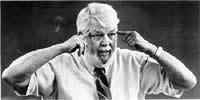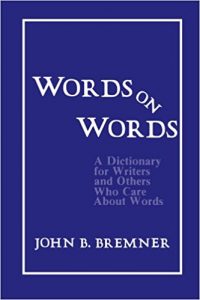This is a re-post of a blog post I did a while back. It is one of those timeless pieces about a one-of-a-kind journalism professor and his love of words and writing. Take a look. I bet you will find it fascinating and helpful. In any case, I hope you enjoy it.
A while back a friend sent me an excellent column about a professor at my alma mater: the William Allen White School of Journalism at the University of Kansas.
The professor’s name was John Bremner, a native of Australia and ordained Catholic priest who left the priesthood to become a journalist. (“Proof that purgatory exists,” he once told me.)
While I never had the late Professor Bremner (he died in 1987) for a class, he made his presence known in the newsroom of the University Daily Kansan where I was the editor-in-chief. He often would stick his head in the door of my office and say something like: “Good paper today, Ron.”
Those were the days I liked. But all too often I heard things like:
“The lead story on page one makes about as much sense as a wallaby giving a sermon,” which was Prof. Bremner’s way of saying it made no sense at all!
Professor Bremner was a stickler for the proper use of the English language. He could get especially cranky when people who make their livings using it every day, such as journalists, misused the lingua franca.

In the introduction of his seminal book “Words on Words,” published in 1980, John Bremner had this to say about language:
“Words are my professional life. It was nurtured by the study of classical and modern languages, which was part of the characteristic education of my generation, at least in my native Australia. Unfortunately, such education has become uncharacteristic, especially in the United States. I have witnessed the steady growth of literary ignorance during a career of more than a third of a century as a professional journalist, a professor of journalism and a newspaper consultant.”
He goes on to say: “Many of my students arrive in my writing and editing classes…with an almost total ignorance of English grammar and usage and only a smattering of any foreign language.”
Those words were probably written in the late 1970s. Believe me, as someone who was until recently a professor at a major university; things have not gotten any better. If anything, they have gotten worse. Sadly, many of my students at the University of Illinois between 1997 and 2010 wrote the English language with the adroitness of a heavy truncheon rather than with the precision of a sharp pen.
During a 1984 seminar for newspaper editors, Bremner told the crowd:
”Jesus Christ once said, ‘Where two or three are gathered together. .’.But he couldn’t have said precisely that. He didn’t speak English. And why would he have said ‘gathered together’? When you have ‘gathered,’ you don’t need ‘together.’ ”
Not even the Bible was safe from Professor Bremner’s reproach.
In 1952 Bremner earned a master’s degree in journalism from Columbia University in New York. When his Columbia class was honored by the journalism school’s alumni association in 1987 for having endowed a scholarship, Professor Bremner was chosen to accept the award. In his acceptance speech, he pointed out all the errors in spelling, syntax, and grammar in the class newsletter. Classic Bremner.
To say John Bremner was an academic legend during his tenure at the University of Kansas is to do him a great disservice. He was an etymological doyen; a philological force; a grammatical guru.
He would have hated that description because he always cautioned me to avoid alliteration whenever possible. “It’s sophomoric,” he once told me. “Unless it is used by a connoisseur.”
Here is the column mentioned above published by Steve Wilson, Executive Editor, of The Paducah (KY) Sun. I hope you will enjoy it, but most of all, be prepared to learn something about words and writing.
———————————————————————————————————————————————————————-
An uncommon love of words
By Steve Wilson
Executive Editor, the Paducah Sun
On a local TV newscast a few days ago, the sports anchor said St. Louis Cardinals’ catcher Yadier Molina had received “the lion’s share of votes” and would be a starter in this summer’s all-star game.
His use of “lion’s share” seemed dubious and sent me back to a favorite book called Words on Words. It’s written by the late John Bremner, an exuberant college professor who was obsessed with the proper use of the English language.
As expected, he had an entry for “lion’s share” that didn’t square with the usage on TV.
“If you use this cliche, know its proper meaning. In one version of the fable, Aesop’s lion got all the meat except a few scraps snatched by the fox. In the other versions, the lion got it all. Properly, the lion’s share means all or almost all of something, not merely a majority.”
Bremner was a charismatic figure – 6-foot-5, 260-pounds, white-bearded, a native Australian who spent the biggest part of his career teaching journalism at the University of Kansas. He also put on seminars for newspaper editors around the country, which is how we met and became friends.
He was an animated instructor, pacing the room, digressing to tell a story about British history one moment, then raging about the confusion caused by a misplaced comma the next. More than once he had thrown open a window in his classroom, waved his white handkerchief, and shouted, “Help, I’m being held captive by a roomful of idiots.”
Such theatrics, he said, were less about ego than connecting with the audience.
“You don’t hold students and professionals by simply filling them with facts and snippets of knowledge. You have to keep them interested, keep them alert.”
He enjoyed pointing out the illogic of many word usages.
“You want the word couple to be singular?” he asked. “All right, the couple was married yesterday. It went to Florida on its honeymoon. OK so far. But it had an argument. So it decided to get a divorce. And it went its separate ways.”
His book is a pleasure to peruse:
Advance planning – Have you planned backward lately?
At the present time – Now.
At this point in time – Now.
Better part of – “She stayed for the better part of an hour” means she stayed for more than a half-hour. Why better? Are the first 30 minutes better than the last 30? Make it “most of the hour.”
Chair – Keep it a noun. What’s wrong with “Smith presided at the meeting” or “Smith was the chairman”? Pretty soon we’ll be saying Smith “podiumed the orchestra” or “pulpited the church.” Some fingers need to be kept in the verbal dikes.
Facilitate – A windy word for “make easier, aid, assist, help.”
Goes without saying – So why say it?
Irregardless – Regardless of the school of “a word is a word if people utilize it,” there is no such word as irregardless.
Precipitate/Precipitous – Though both adjectives derive from the same root (Latin praeceps, headlong), precipitate means excessively hasty and refers to actions, whereas precipitous means extremely steep and refers to physical objects. The bishop who counseled against “precipitous marriage” either was ignorant of the distinction or was jumping to the conclusion that rash decisions lead to rocky adventure.
Split infinitive – Splitting an infinitive means inserting one or more words between the to and the verb, as in “to thoroughly appreciate.” Banning the split infinitive is ridiculous. The so-called rule has no foundation in logic, rhetoric or common sense. Go ahead and split. Let euphony be your guide. Never to split is to seriously stifle.
Toward/Towards – Most authorities consider toward American and towards British. But a case can be made for towards in American usage when the following word begins with a vowel sound. There is sibilant smoothness in “towards evening.”
Ugly scar – Don’t say, “He has an ugly scar on his face.” Drop ugly. Ugliness is in the eye of the beholder. Don’t force the reader to subscribe to your sensitivities.
For all his wit and wisdom about editing, one of the most memorable moments of our seminar came at the end when Bremner said he wanted to share a poem by John Ciardi.
He first explained that a widgeon is a duck, a wicopy is a tree and widgeons do not roost in trees. When the editors gave him quizzical looks, he smiled and proceeded to recite the lines from memory:
A widgeon in a wicopy
In which no widgeon ought to be,
A widowed widgeon was.
While in a willow wickiup
A Wichita sat down to sup
With other Wichitas,
And what they whittled as they ate
Included what had been of late
A widgeon’s wing.
‘Twas thus
The widgeon in the wicopy,
In which no widgeon ought to be,
A widowed widgeon was.
When he finished, he told the group in a soft-spoken voice, “If you don’t like that, get out of this business.”
Bremner devoted his life to the best use of words. A tender, alliterative arrangement could make his day.


